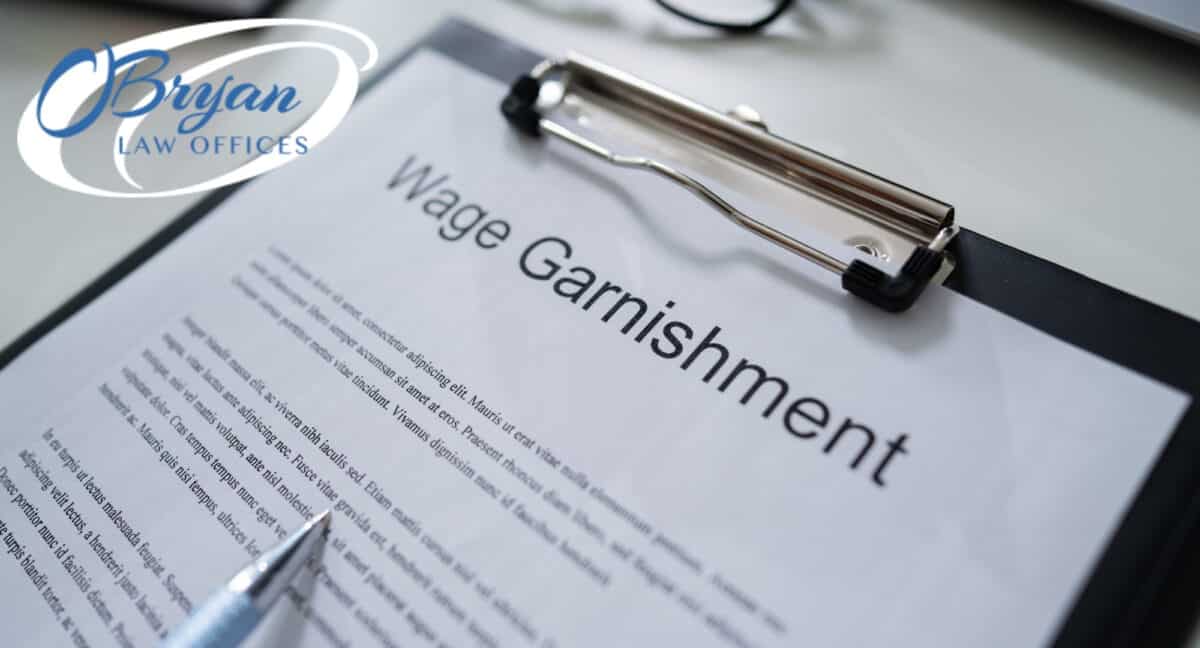Garnished Wages Without Notification


You provide for your family by going to work every day, and several deductions come out of your paycheck. These include mandatory contributions such as taxes, Social Security, and unemployment insurance. Elected deductions are withheld as well, such as retirement and health insurance. So, another deduction for garnishment of wages means you take home even less of your hard-earned income. Garnished wages without notification can be extremely stressful.
The Louisville wage garnishment lawyers at O’Bryan Law Offices are familiar with all aspects of debtor and creditor issues as well as bankruptcy law. Our firm focuses on providing relief to clients experiencing financial stress. Our dedicated garnished wages lawyers review the unique facts of your situation and propose a relief plan that best addresses your needs and requirements.
Call O’Bryan Law Offices today to discuss your wage garnishment and establish an attorney-client relationship. Year after year, our law firm successfully represents clients in tight financial spots. Let us provide you with the effective and meaningful counsel you need to get your finances back on track. Call 502-339-0222 to schedule your free consultation with us.
What Is Wage Garnishment?
Wage garnishment happens when a creditor directly withholds funds from your paycheck to satisfy unpaid debts. Wage garnishment often occurs after you default on a loan or stop making payments on credit card debt.
A creditor must take specific steps before they may garnish your wages. First, they file a lawsuit against you for not making payments on your debt. They must notify you of the suit, go to court, and get a money judgment against you. The court automatically grants the creditor a default judgment against you if you fail to appear in court.
Your creditor may begin the wage garnishment process once they have this judgment.
Why Are My Wages Being Garnished?
A creditor pursues wage garnishment for the following reasons:
- Your debt collector or creditor sued you, and a court granted a judgment against you.
- Child or spousal support arrears.
- You are in default on federal student loans or federal taxes.
Note: The federal government may garnish your wages without a court judgment if you owe back taxes or default on federal student loans.
Is Wage Garnishment Notice Required?
You’re struggling with debt and dealt a new blow – wage garnishment. Now your paycheck is less than what it should be. You didn’t receive notice of the garnishment, and now you’re panicking because it’s going to be harder to pay your bills. Did your employer have a requirement to let you know about the garnishment?
- Your employer is legally obliged to quickly respond to the creditor or government entity when they receive a writ of garnishment. If they do not, they could end up paying fines or even be held responsible for the total amount of your debt. Your employer must comply and withhold the money from your pay.
- Notifying the employee of the garnishment or providing a copy of the garnishment to the employee is a common courtesy. However, state laws don’t usually require this action. State laws also don’t require the employer to allow time for the employee to dispute the debt or the garnishment.
So, while having your employer inform you of a wage garnishment ahead of time would be ideal, your employer isn’t legally required to do so. Turn to an experienced Kentucky wage garnishment attorney if this happens to you.
Who Can Garnish My Wages in Kentucky?
In the state of Kentucky, the following parties may garnish an employee’s earnings, once they obtain a valid court judgment:
This category includes credit card companies, banks, and other entities to whom you owe money.
Creditors hire debt collection agencies or debt collectors to collect the money you owe them.
Original creditors often sell your debt to a debt buyer when they discontinue efforts to collect the debt.
The following entities do not need a court judgment to collect on special types of debt:
The IRS may use a wage levy to collect back taxes.
Together with the Department of Education, federal student loan servicers may collect defaulted student loans.
A child support enforcement agency may garnish your wages to pay your child support arrears.
How Do Wage Garnishments Work?
The creditor sends a wage garnishment order to an employer once they receive a judgment. Your employer then holds part of an employee’s wages from each paycheck and sends it to the creditor. The garnishment ends once you repay the entire judgment or reach a debt settlement or payment plan with the creditor. Child support payments, back taxes, and student loans follow a similar process.
Limits on Wage Garnishment Amounts
What percent of your wages can be garnished? Federal wage garnishment law limits the percentage of your wages that creditors may withhold from your paychecks. These amounts differ depending on the type of creditor: taxing authority, child support collector, student loan collector, or judgment creditor.
The maximum amount allowed for wage garnishments is generally 25% of a debtor’s “disposable wages.” Disposable earnings are leftover funds after legally required deductions such as taxes and Social Security are withheld from your paycheck. Garnishments also may not be more than the amount by which your income exceeds 30 times the federal minimum wage. The federal minimum wage stands at $7.25 an hour. Thirty times $7.25 is $217.50. You are not eligible for garnishment if you make less than this weekly amount after taxes.
State laws may offer debtors additional protection by limiting garnishment amounts even further.
Judgments for child support are not subject to these limits.
Wage Garnishment Example
Say you take home $640 each week after your deductions. Federal and Kentucky laws allow a judgment creditor to garnish up to 25% of the $640. Another option is garnishing the amount by which $640 exceeds $217.50. The creditor may garnish the lesser amount of the weekly disposable income.
Let’s see how that looks:
- $640 x .25 = $160
- $640 – $217.50 = $422.50
The maximum amount a creditor may take per paycheck is $160.
Creditors use this formula when calculating the garnishment amount for all consumer debts. Special rules govern special debts like child support arrears, federal back taxes, and defaulted student loans. These debts are subject to different maximum garnishment amounts.
Objecting to the Wage Garnishment
A debtor may object to the wage garnishment or the amount withheld. In this case, the debtor must file a Claim of Exemption with the court that issued the judgment.
Wage Garnishment Exemptions
Wage garnishment exemptions serve as a way of protecting certain types of income or more than a certain amount of your pay. The premise behind allowing exemptions is that people may keep some earnings to pay basic living expenses.
Exemption laws exist in each state, and depending on your situation, laws may fully or partially protect your income.
Can SSI be garnished? Full exemptions are available for the following types of income:
- Child Support
- Disability
- Retirement
- Spousal Support
- Social Security
Unless an exemption applies to your case, wages are usually subject to garnishment. Debtors earning lower incomes may be able to retain all their income, while creditors can garnish high earners’ pay.
Your Employment and Wage Garnishment
Employees are protected under the Consumer Credit Protection Act from being fired for multiple wage garnishments from the same creditor. However, you could lose your job if you have more than one garnishment from different creditors.
Speak with a Kentucky Bankruptcy attorney at O’Bryan Law Offices immediately if you are facing garnishment of wages from multiple creditors – it may save your job!
Stop a Wage Garnishment by Filing for Bankruptcy in Kentucky
Filing bankruptcy stops most wage garnishments, the process could also save your job and ensure that you don’t lose all the assets that you’ve worked so hard to acquire. As with any legal process, exemptions also apply during bankruptcy proceedings. Kentucky has a list of exceptions filers may use. These exemptions help protect the property needed to maintain employment and a home, including clothing, furniture, and a modest vehicle.
Property that is not covered is nonexempt. Chapter 7 bankruptcy and Chapter 13 bankruptcy treat nonexempt property differently.
Chapter 7 Bankruptcy
A court-appointed bankruptcy trustee oversees your Chapter 7 bankruptcy. They sell your non-exempt property and pay your creditors with the proceeds.
Chapter 13 Bankruptcy
Bankruptcy filers may retain non-exempt property in a Chapter 13 bankruptcy, but they pay creditors for its value during a 3-5 year repayment plan. Filers must pay either the value of their non-exempt property or their disposable income – whichever amount is greater.
Please note that property exemptions are not automatic. You’ll notify the court about the property you intend to keep by listing it on a “Schedule C: The Property You Can Claim as Exempt” form. Failure to file this form places your potentially exempt property at risk.
Bankruptcy and the Automatic Stay
Filing a Chapter 7 or a Chapter 13 bankruptcy places an automatic stay on your creditors. The stay keeps the creditor harassment at bay and stops further collection attempts on most of your debt. However, creditors may petition the court to lift the stay and allow the resumption of collection activity.
Priority debts, including child and spousal support as well as criminal fines, are not subject to the automatic stay in bankruptcy.
In most cases, creditors may not garnish your wages without filing and winning a lawsuit against you, receiving a favorable judgment, and getting garnishment orders from the court. Filing for bankruptcy prevents a judgment, so creditors can’t submit an earnings withholding order to a debtor’s employer.
Act Quickly and Contact a Kentucky Bankruptcy Lawyer Today
Wage garnishments don’t happen out of the blue. Debtors should receive a legal notification that a creditor intends to move forward in an attempt to collect the debt. If you receive notice of pending wage garnishment, you must act quickly to avoid the action against you.
Our bankruptcy attorneys in Kentucky discuss how to stop wage garnishment and work with each client to select a solution that offers the most favorable results. Whether a bankruptcy filing or another solution best resolves your situation, we look at your individual case and specific needs. Over the past three decades, our practice has helped clients make the best decisions possible to start over fresh. Our compassionate legal team understands how difficult your financial situation is, and we are here to help you become debt-free. Please call us at (502) 400-4020 and schedule your free consultation.
Our firm handles various aspects of the law, including Kentucky legal separation, Kentucky uncontested divorce, Kentucky personal injury, and more. Please don’t hesitate to reach out to us with your legal concerns – we are here to help you!








